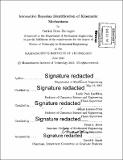Interactive Bayesian identification of kinematic mechanisms
Author(s)
Barragán, Patrick R
DownloadFull printable version (11.01Mb)
Other Contributors
Massachusetts Institute of Technology. Department of Mechanical Engineering.
Advisor
Leslie Pack Kaelbling and Tomás Lozano-Pérez.
Terms of use
Metadata
Show full item recordAbstract
This thesis addresses the problem of identifying mechanisms based on data gathered from a robot's interaction with them. We present a decision-theoretic formulation of this problem, using Bayesian filtering techniques to maintain a distributional estimate of the mechanism type and parameters. We begin by implementing a discrete Bayesian filter. We demonstrate the approach on a domain with four primitive and two composite mechanisms. In order to reduce the amount of interaction required to arrive at a confident identification, we select actions explicitly to either a) reduce entropy in the current estimate or b) race the top two hypotheses to clearly distinguish between them. The results show that this approach can correctly identify complex mechanisms including mechanisms which behave different in different parts of their configuration spaces. The results also show that active action selection can significantly decrease the number of actions required to gather the same information while the racing technique does so without increasing step time of the filter over random action selection. We analyze Bayesian filtering in a hybrid space for model comparison. We discuss the appropriateness of continuous state-space, parametric filters for the mechanism identification problem. We seek an alternative strategy because no parametric form is clearly suited to representing the posterior distributions during the filtering process. We find that Bayesian filtering in the hybrid space has some surprising consequences and discuss their effect on inference. Finally, we implement a particle filter which allows filtering in a space expanded from 10 model-parameter pairs to 50,000. We demonstrate that with high accuracy, the particle filter can correctly identify the mechanism type. More crucially, we show that the filter's estimate allows the robot to reasonably predict the motion of the given mechanism regardless of classification. We demonstrate our method in simulation and on a real-world PR2 robot interacting with common mechanisms.
Description
Thesis: Ph. D., Massachusetts Institute of Technology, Department of Mechanical Engineering, 2015. Cataloged from PDF version of thesis. Includes bibliographical references (pages 127-128).
Date issued
2015Department
Massachusetts Institute of Technology. Department of Mechanical EngineeringPublisher
Massachusetts Institute of Technology
Keywords
Mechanical Engineering.